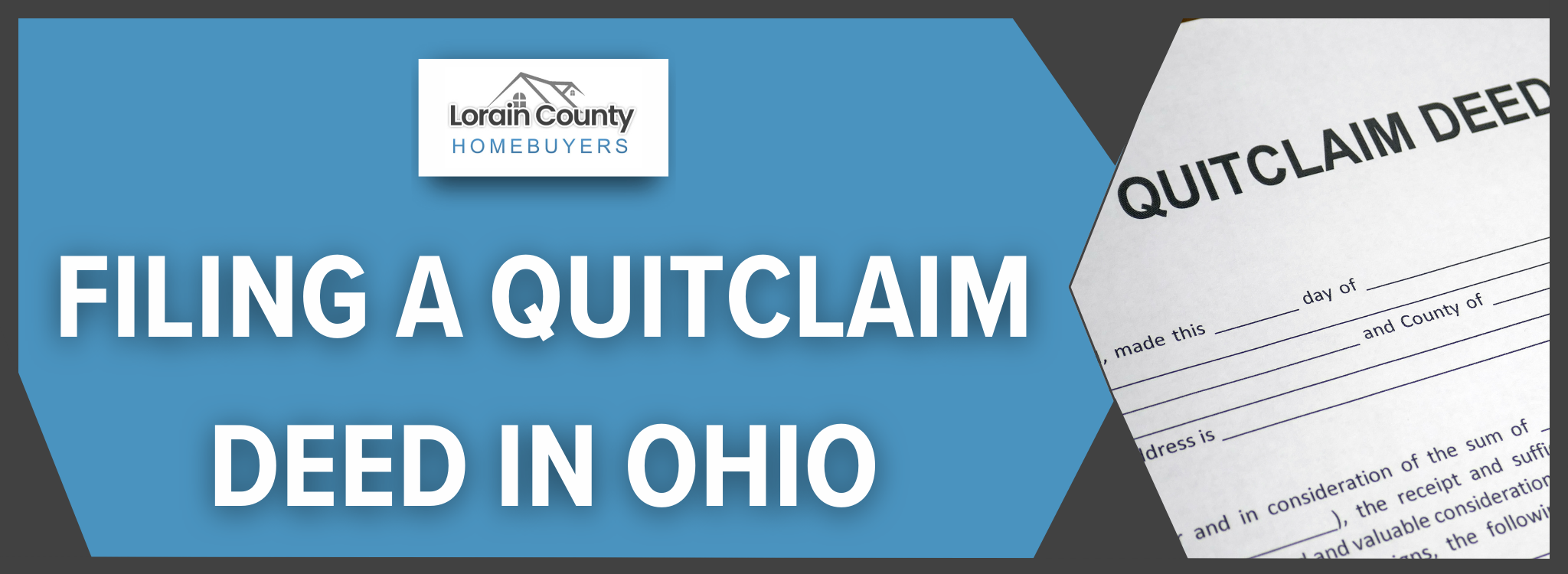
Understanding Ohio Quit Claim Deeds
A quit-claim deed can be used in Ohio to change who owns a property. These deeds give the grantor’s share of the property to someone else, who is called the grantee. Different kinds of deeds don’t promise that the title is good or take care of any claims already on the property. Don’t say that deeds do. You should know what this kind of deed does when you buy or sell a house.
What Are Quit-Claim Deeds?
You can legally give someone else property ownership without making any promises about the title with a quit-claim deed. On the other hand, warranty deeds ensure the title is clear. People who know each other, like family members, or want to remove someone’s name from a title often do give-and-take deeds.
How Do Quit-Claim Deeds Differ from Warranty Deeds?
What makes quit-claim deeds and warranty deeds different?
- Title Assurance: A warranty deed lets the buyer know that the grantor has a clear title and will fight any future claims. On the other hand, a quit-claim deed only gives away the grantor’s interest, which might not be anything.
- Usage: Quitclaim deeds are often used to fix mistakes in the title or move property within the same family. When someone buys a house, they often use warranty deeds to ensure clear ownership.
If you know these differences in Ohio, you can pick the correct type of deed for your deal.
When Should You Use a Quit-Claim Deed?
In Ohio, a quit-claim deed is valid when the following comes true:
- Family Transactions: Moving property from one family member to another is an example of a family transaction. Another example is adding or taking away a spouse’s name after getting married or divorced.
- Correcting Title Issues: Correcting mistakes in the property title, like misspelled names or incorrect legal descriptions.
- Trust Transfers are made by the grantor and trustee, who are sometimes related or the same person.
Talk to a lawyer if you want to fully understand how to use a quit claim deed to move property.
Legal Requirements for Quit-Claim Deeds in Ohio
What Are the Key Provisions of Ohio Real Estate Law?
Ohio’s real estate law is based on statutes defining how property should be transferred. In Ohio, a quitclaim deed lets someone give someone else their share of a property without guaranteeing the title. If you know these rules, you can avoid trouble with the law.
Several things must be true for an Ohio quitclaim deed to be legal. These include ensuring that everyone involved is identified, accurately describes the property, and the intent to transfer ownership is clear. You can help ensure you follow these rules correctly by talking to a lawyer specializing in Ohio real estate law.
Are There Specific Ohio Statutes Governing Quit-Claim Deeds?
Yes, Ohio has specific rules about how to sign and record quitclaim deeds. Section 5301.25 of the Ohio Revised Code outlines the steps needed to record deeds, such as quitclaim deeds. Because of this law, all deeds must be recorded in the county where the property is located. Recording is essential because it lets people know when ownership changes.
The quitclaim deed must be formatted correctly to follow Ohio’s legal rules. This means that it has to be signed and notarized. The deed might not be valid if you don’t follow these rules. By following Ohio’s rules, you can ensure your quitclaim deed is valid.
How Is Property Ownership Transferred via Quit-Claim Deed?
In Ohio, several steps are needed to use a quitclaim deed to transfer property. First, the deed needs to be made, with clear names for the grantor and grantee and a full property description. A notary public checks the deed’s signatures to ensure they are real.
After signing the quitclaim deed, it needs to be taken to the county recorder’s office in the area where the property is located. When the deed is recorded, it makes the transfer official and updates the chain of title, which lets everyone know that the owner has changed. Hiring a professional who knows how this process works can help ensure all legal steps are taken correctly.
You should talk to a real estate lawyer if you need more help with Ohio quitclaim deeds. Lorain County Homebuyers provides advice and resources to help people understand real estate transactions.
Filing Procedures for Quit-Claim Deeds in Ohio
Where Can You Obtain Ohio Quit-Claim Deed Forms?
To change who owns a property in Ohio, you must use the proper forms and a quitclaim deed. These papers are required to transfer property legally. You can get Ohio quit-claim deed forms at office supply stores or online from reputable legal document sources. The county recorder’s office may also have these forms. Check to see if your paper is an Ohio real estate form. There is an example of an Ohio quitclaim deed that can help you fill out the form correctly.
What Steps Are Involved in Completing a Quit-Claim Deed?
For Ohio quit claim deeds to work, you need to pay close attention to a few steps:
- Prepare the Form: Write the names of the grantor and grantee on the quit claim deed form.
- Legal Description of Property: Give a complete description of the property. Match the legal description on the deed.
- Signatures: A notary must witness the grantor sign the deed, which is valid in Ohio after this notarization.
- Completion Check: Please check the form again to ensure it is correct and complete. Mistakes can lead to legal problems.
If you do these things, your quit claim deed will be ready to be filed with the right people.
How Do You File a Quit-Claim Deed with the County Recorder?
Send the signed quit claim deed to the county recorder’s office in Ohio, where the property is located. How to do it:
- Locate Your County Recorder: Use the property address to find the Ohio county recorder’s office.
- Recording Process: Bring the quit-claim deed to the office. The deed will be written down, making the transfer public.
- Filing Fees: Prepare to pay fees specific to your county. First, look at the prices.
- Verification and Documentation: Ask for a copy of the recorded deed to check the filing.
Learn how to record a quit-claim deed in Ohio to make it easier to sell or give away property and to meet state requirements. For help, contact your Ohio county recorder.
Costs and Fees Associated with Quit-Claim Deeds in Ohio
What are the typical fees for filing a quit-claim deed?
In Ohio, the fees for filing a quit-claim deed can differ from county to county. These are some of the most common fees you might see:
- Filing Fee: The Ohio county recorder’s office charges a filing fee, which is usually between $28 and $34. This fee might be slightly different in some counties, like Franklin County, Cuyahoga County, Butler County, Hamilton County, Summit County, and Montgomery County.
- Transfer Tax: A transfer tax based on the property’s value is often charged as part of the deed transfer process.
- Additional County Fees: Some counties in Ohio may charge extra to record deeds. You should talk to your county recorder for exact costs.
How Does the Transfer Tax Apply to Quit Claim Deeds in Ohio?
Transfer taxes are often due when a quit-claim deed is signed in Ohio. By law, these taxes have to be paid when property is transferred. Some essential points are:
- Transfer Tax Calculation: The Ohio deed transfer tax is set by law and is usually based on the property’s worth at the time of the transfer.
- Exemptions: Certain transfers may not be subject to Ohio real estate law. Talk to the Ohio County recorder’s office to find out if any exceptions apply to your case.
Are There Additional Costs for Notarization or Legal Assistance?
In Ohio, there are extra fees for getting a quit-claim deed notarized and for hiring a lawyer:
- Notarization: The quitclaim deed must be notarized for it to be valid. Most notaries charge between $5 and $25 per signature.
- Legal Assistance: Getting legal help from a lawyer can help ensure that the quitclaim deed follows all the rules set by the law. Lawyer fees depend on the complexity of the case and the lawyer’s charges.
- Court and Compliance Costs: You may have to pay extra for more legal work, like filing affidavits or going to court.
If you’re considering this process, talking to an experienced real estate lawyer can help you comply with Ohio’s laws.
Common Pitfalls and Challenges in Filing Quit-Claim Deeds
What Are Common Mistakes to Avoid When Filing?
Many people in Ohio make a few mistakes when they file a quitclaim deed, which can cause delays or legal issues. Often, people mess up when they fill out the quitclaim deed form. Filling out the form completely and accurately is essential, as mistakes could render the deed useless. Also, the deed wasn’t recorded with the county recorder. You must file the deed transfer with the county recorder to be valid in Ohio. A lot of people also don’t talk to a lawyer first. Any doubts about whether the quit-claim deed is legal in Ohio can be cleared by talking to a lawyer.
How Can You Ensure Accuracy and Compliance with Ohio Law?
Ensuring your Ohio quitclaim deed is correct and follows the law is essential. Here are some steps you can take:
- Consult an Attorney: How do you learn more about the rules for Ohio quitclaim deeds? Talk to a lawyer. A lawyer can answer any question about the law.
- Notarization: It is important to get the quitclaim deed signed by a notary. This step must be taken according to Ohio law for the deed to be valid.
- Complete All Information: It is important to ensure that the deed has all the correct information written on it. One made in Ohio can help you ensure that you don’t forget anything.
- File with County Recorder: Send the deed immediately to the correct county recorder’s office after it has been signed and completed. It’s essential for the law and public records that this is filed.
What Resources Are Available for Assistance and Guidance?
Ohio has several places that can help you file a quit-claim deed:
- Attorney Services: When you hire an attorney, they will ensure you follow the law and handle any tricky legal issues.
- Law Libraries: In Ohio, many law libraries have materials and forms for real estate deals, such as quitclaim deeds.
- Ohio County Recorder’s Office: Tell your county recorder’s office exactly how to file deeds and follow their rules. They can help you find forms and other help.
- Real Estate Forms: Templates and forms for Ohio deed transfers already made by other legal platforms can be used.
- Quit Claim Deed Services: Stop using Quit Claim Deed Services. If you need quick help and advice, check out Lorain County Homebuyers, an expert on real estate deals in Ohio.
Filing Ohio quitclaim deeds can be challenging, but these tools will help you do it correctly and confidently.
FAQs:
How do I file a quit-claim deed in Ohio?
To file a quit claim deed in Ohio, complete the deed form, have it notarized, and submit it to the county recorder’s office. Include the required filing fees, which differ by county.
What are the legal requirements for a quit-claim deed transfer in Ohio?
The grantor must sign the quit claim deed in Ohio before a notary public. After that, file the deed with the county recorder’s office where the property is located.
Where can I obtain the necessary forms for a quit-claim deed in Ohio?
You can download quit-claim deed forms from various online sources. Make sure to choose a form specifically for Ohio, as each state has different requirements.
Can a quit-claim deed transfer property in probate cases in Ohio?
Yes, a quit-claim deed can be used in probate situations. However, it is recommended that you consult an attorney to ensure compliance with Ohio probate laws.
What should I consider when transferring property using a quit-claim deed in Ohio?
A quit-claim deed provides no guarantees about title defects. It’s advisable to seek legal advice to ensure this transfer method suits your property needs.
Are there any tax implications when filing a quit-claim deed in Ohio?
Using a quit-claim deed may have tax implications. Consult a tax advisor or attorney to understand potential costs or tax responsibilities.
How does a quit-claim deed differ from a warranty deed in Ohio?
A quit claim deed transfers only the grantor’s interest in the property without guarantees, while a warranty deed ensures the grantor holds a clear title to the property.
Can attorneys help with filing a quit-claim deed in Ohio?
Yes, attorneys can assist in preparing and filing quit-claim deeds, ensuring you comply with Ohio regulations, and addressing any legal concerns.
Key Insights
- To file a quit-claim deed in Ohio, visit your local county recorder’s office. This step is crucial for legally transferring property ownership.
- Understanding how to file a deed in Ohio involves knowing the differences between quitclaims and warranty deeds, which impact legal ownership and title guarantees.
- When filing a quit claim deed in Ohio, include a self-addressed stamped envelope to receive your original documents and any receipts or confirmations.
- Be aware of Ohio’s quit claim deed requirements. To ensure legality, the deed must be notarized and recorded at the county recorder’s office.
- Ohio laws, especially sections 5301 and 5302, guide the process for quit-claim deed transfers. They ensure accurate property descriptions and legal compliance.
- Consult an attorney or law expert specializing in trust law and real estate to navigate complex transactions, such as trust, executor, and fiduciary responsibilities.
- Knowing where to file a quit claim deed in Ohio—in counties like Cuyahoga, Franklin, or Hamilton—helps streamline the property transfer process.
- Familiarize yourself with quit claim deed fees in Ohio, as costs can vary based on county regulations and additional fees from the recorder’s office.
- For legal advice and assistance with quitclaim deeds, contact professionals who can answer questions about marital property transfers or deed limitations in Ohio.
- If you’re considering alternatives, learn the distinctions between a quit claim deed vs. a warranty deed in Ohio, as they provide different levels of protection for property buyers and sellers.
This information applies to Ohio and its cities, including Lorain, Amherst, and Cleveland. For assistance or questions, please call us at (440) 681-2114. You can also visit our website at Lorain County Homebuyers for more details.







